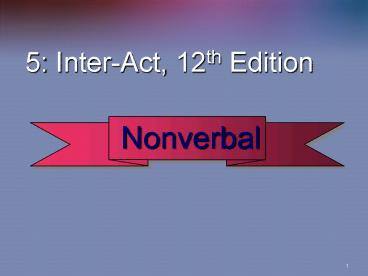Nonverbal - PowerPoint PPT Presentation
1 / 24
Title:
Nonverbal
Description:
Microsoft Photo Use of Time Chronemics Monochronic Polychronic Time Orientation Past Present Future * * Time How do we manage and react to others management ... – PowerPoint PPT presentation
Number of Views:251
Avg rating:3.0/5.0
Title: Nonverbal
1
5 Inter-Act, 12th Edition
Nonverbal
2
Nonverbal Communication
Verbal Communication
- The words we use
- Bodily actions and vocal qualities that typically
accompany a verbal message
3
Characteristics of Nonverbal Communication
- Intentional or unintentional
- Primary
- Ambiguous
- Continuous
- Multichanneled
4
Functions of Nonverbal Communication
- To provide information
- To regulate interaction
- To express or hide emotion and affect
- To present an image
- To express status, power, and control
5
Regulate Interaction
Facial expressions or gestures that are used to
control or regulate the flow of a conversation
Microsoft Photo
6
Express Emotion or Affect
- Facial expressions and gestures that augment the
verbal expression of feelings
Microsoft Photo
7
Types of Nonverbal Communication
- Body language
- Paralanguage
- Vocal interferences
- Spatial usage
- Self-presentation
Everything except words!
8
Body Language Kinesics
- Eye contact
- Facial expressions
- Emoticons
- Gesture
- Posture
- Touch
9
Body Language Touch
- Touching and being touched are essential to a
healthy life - Touch can communicate power, empathy,
understanding
Microsoft Photo
10
Paralanguage
- Pitch
- Volume
- Rate
- Quality
- Intonation
11
Vocal Interferences
- Extraneous sounds or words that interrupt fluent
speech - uh, um
- you know, like
- Place markers
- Fillers
12
Spatial Usage
- Informal space (proxemics)
- Intimate distance
- Personal distance
- Social distance
- Public distance
- Acoustic space
- Territory
- Artifacts
13
Personal Space at Work
- Your office
- Your desk
- A table in the cafeteria where you sit regularly
Microsoft Photo
14
Color Influences Communication
Yellow cheers and elevates moods
Red excites and stimulates
Blue comforts and soothes
In some cultures black suggests mourning
In some cultures white suggests purity
15
Self-Presentation Cues
- Physical Appearance
- Race and gender
- Size and shape of body
- Clothing
16
Self-Presentation
- What message do you wish to send with your choice
of clothing and personal grooming?
Microsoft Photo
17
Use of Time
- Chronemics
- Monochronic
- Polychronic
- Time Orientation
- Past
- Present
- Future
18
Time
- How do we manage and react to others management
of time? - duration
- activity
- punctuality
Microsoft Photo
19
Use of Scents
- Olfactory Communication through
- Perfume
- Cologne
- Aromatherapy
- Body odor
Microsoft Photo
20
Cultural and Gender Variations
- Body language
- Paralanguage
- Space
- Self-presentation
21
Nonverbal Signals
Vary from culture to culture
Microsoft Photo
22
What does this symbol mean to you?
- In the United States it is a symbol for good job
- In Germany the number one
- In Japan the number five
- In Ghana an insult
- In Malaysia the thumb is used to point rather
than a finger
-Atlantic Committee for the Olympic Games
23
Improving Nonverbal Communication Skills
- When sending messages
- Be conscious of nonverbal behavior
- Be purposeful in use of nonverbals
- Make sure nonverbals are not distracting
- Match verbal and nonverbal communication
- Adapt to the situation
24
Improving Nonverbal Communication Skills
- When receiving messages
- Dont automatically assume
- Consider gender, culture, and individual
differences - Pay attention to all aspects of nonverbal
communication - Use perception checking































